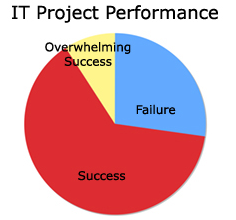Healthcare data sucks - that song turned my Friday to Friyay!!! Gave me the much needed boost to get through…
MD Leader 1/15/09
Successful Projects
With the use of project management methodology, Ministry Health Care has consistently improved the success rates of IT projects. Any effort installing new software or requiring more than 100 hours of IT time is considered a project. Even using project management, 25% of our closing reports reflect a failed project; one that was not managed to the agreed upon timeline, scope or budget.
Before you start thinking your projects have a better success rate than ours, here is what we define as failures:
- Actual expenses varied by more or less than 10% of budget
- Total project hours varied by more than 10% of planned hours
- Completion date varied by more than 15% of the original completion date
- Two or more material scope changes
- Less than 80% of project objectives attained
- The project’s impact on the organization was not anticipated or was not effectively communicated
Business leaders often bristle at being told their project was a failure because they brought a project in under budget or with fewer project hours than budgeted (the cause of the majority of failed projects). However, we are managing a portfolio of projects limited by resource constraints. If all our projects come in 20% under budget, that means the organization accomplished 20% less than it could have with the same resources.
We also do an additional evaluation at least six months after the closing report evaluating if the project achieved its long-term objectives. Many failed projects are subsequently vindicated.
I recently completed a Physician Executive MBA ( PEMBA) at the University of Tennessee. My classmates were physician leaders from across the county and numerous foreign countries. Their experience with IT projects was uniformly negative. In general, they thought IT was done to them rather than with them. These leaders reaction to IT should give us all a pause to evaluate our implementation strategy.
Will Weider, our CIO, recently listed Ministry’s "lessons learned" based on 2008 projects:
- Test thoroughly
- Good process and leadership trumps bad software
- Roles should be clearly defined and consistent with our Lean and Six Sigma engagement and acceptance strategy
- Business leaders should fully understand current practice and issues before new software or process change is considered
- Hours are consistently under budget due mostly to the assignment of unnecessary contingency in the project plans.
- Formalize Lean and Six Sigma activities in EHR project plans
We did have one perfect project last year (on time, one budget, satisfying all objectives): a medication reconciliation project at one of our internal medicine offices. This project was not initially supported by our CIO because it was a duplication of effort. We are in the process of implementing CattailsMD electronic health record, but this site will not go live for some time. The CIO correctly pointed out the existing software that was utilized will be replaced by CattailsMD.
The Project Team, comprised of nursing and clinician staff, rightly argued the software was the easy part; the tough part was establishing a standardized process for medication reconciliation. A standard process can be adapted to the future software solution. The team was lead by a Black Belt utilizing lean methodology to map out a future process flow and then used standard change management tools to achieve stakeholder engagement and acceptance. IT and project management played a supportive role. The project was done with the clinicians rather than directed at them.
Our deployment of the EHR will be accomplished with the same techniques used in our medication reconciliation project. Ministry Medical Group will own the implementation assisted by IT and Project Management. While the organization will establish certain high level standards, each practice site will use lean methodology to define its own standardized work flow. A system-wide rollout the EHR software will be accomplished through multiple small work site-centered projects allowing clinicians and staff to improve and own their work flow.
With the new year starting, sit back and evaluate the success of your projects. Share with us your lessons learned, the common characteristics of your successes and how you were able to achieve the acceptance and engagement of your stakeholders. I look forward to hearing from you.
Peter Sanderson, MD, MBA is a family physician and Director of Medical Informatics and Operations and Executive Sponsor, EHR Program, at Ministry Health Care. He can be reached at pete.sanderson@ministryhealth.org. He also blogs at MD Leader.




An interesting post — A partner and I are ramping up to start a consulting practice sharing best practices for HIT projects. We are consistently amazed at what a little project management rigor can do to keep the ship on course.
Thanks, always interested to hear success stories and lessons learned on HIT projects.
I can understand that you don’t want people padding their budget estimates to ensure 100% success, but I also understand why someone might bristle at having their project labeled a failure for completing work too far ahead of schedule or producing something at a lower cost than expected. Much is learned during the course of a project, and it seems like you might inadvertently be disincentiving people from taking advantage of optimization opportunities.
Great post! I love it when the clinicians take ownership of the clinical projects. Unfortunately that is not the norm in our organization but we’re getting there. My primary soapbox as CIO is that IT should not ‘do it’ to them – if they want something they need to own it. We are there to assist them in anyway we can. We have at least gotten to the point that we are no longer calling them IT projects but Clinical Technology projects. When a technology project is planned/budgeted it shows up in capital as the department who is driving the implementation.
“Good process and leadership trumps bad software.”
There are some many things wrong with this statement I don’t no where to start. Suffice it to say I completely disagree with this statement.
Nothing trumps “bad software.”
Hello Mr H,
What do you think about the Sunquest thread in the Discussion area? Do you think it is wise for employees to sound off about their employer in a public discussion area like HISTalk? I guess it wasn’t so wise for the poster who got dismissed. Not everyone can be a Justin Deal. Interested in your thoughts.
BN
[From Mr. HIStalk] I hope they’re not using their real names and that someone wasn’t axed because they were. Posting anti-employer rants is risky if you aren’t absolutely certain you don’t give yourself away, even by the subtle nature of what you said or when you said it (like the police, employers always look for someone with motive, which can narrow the field down more than you might think). And, I don’t always run them, especially if they insult someone by name. If someone hates their employer that much, it’s time to either find a new job or quit complaining. I’ve been in the same position and my only regret was that I waited too long to leave because of inertia.